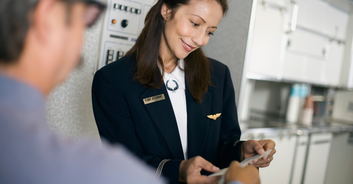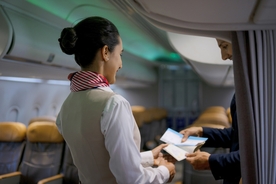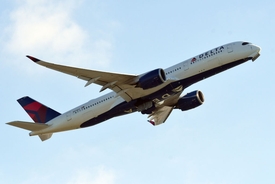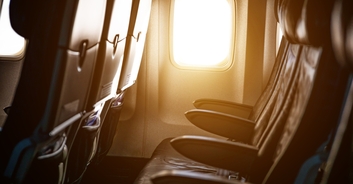Any frequent flyers reading this will know that after a certain number of flights, all journeys start to feel pretty repetitive.
You check-in, go through security with your teeny tiny bottles of shampoo, you spend three hours in purgatory (I mean, duty-free), then you queue for your gate, get your boarding pass checked, sit in a cramped chair for six hours, stand up way too early once the plane's landed, and then quietly race everybody else to baggage claim.
However, despite appearing to be very 'routine', there's a lot that goes on behind the scenes that most passengers are completely unaware of.
Check out the awkward moment a couple was caught coming out of a plane toilet together:For example, flight attendants have a lot of confidential methods that they use to communicate with one another in order to help the flight go smoothly without alarming any of the passengers.
In fact, one cabin crew member took part in a Quora Q&A that revealed the real reason why flight attendants greet passengers as they board the plane and why they ask for their boarding passes.

Now, most of us will probably assume they're just being polite and helping to direct us to our seats - but that's not the case. (I mean, unless you're going in the cockpit, you can safely assume you're going down the fuselage where all the seats are.)
It actually has a hidden security purpose that I guarantee you'd never have thought of, and that is to assess the health and general wellbeing of the passenger, and confirm that they are indeed in a fit state to fly.
This gross passenger should never have been allowed on this flight:Shrey P, who claims to have been a flight attendant for five different airlines, stated that the crew "check plenty of things and it will all happen in a glance". Some of the main points Shrey listed were:
- What kind of clothes are you wearing?
- Are you traveling alone or with someone?
- How patient are you while waiting in that long line during boarding?
- If you are an able bodied passenger, in case we need help for any kind of emergency.
- Are you intoxicated?
- What kind of book are you carrying or reading? (If you are reading a medical journal or so we know who to approach for First Aid)
Shrey then stated: "The list can go on which usually happens in few minutes of boarding time."
Myriam Frafar, a flight attendant for German airline Condor, confirmed Shrey's points, explaining the valid reason for the cabin crew asking for your boarding pass on the thread. Frafar explained:
"I check if they are drunk, drugged, sick, angry or afraid. That is extremely important as if I have the possibility to avoid any kind of troubles over the Atlantic, then I address it on ground. I say 'Hello, welcome on board', and I listen to how they respond."
Another attendant stated on the thread that they also use the meet and greet moment at the aircraft door to check whether a passenger is ill and may need further treatment on the ground, stating: "I've had passengers board who look pasty and pale, deathly ill. We removed them; nobody wants their flu germs!"

Shrey also revealed the truth about your in-flight meals, saying:
"[They] are very unhealthy. Even if you have ordered that raw meal, vegan meal, bland meal etc. The food on your tray is prepared not in the galley but in the aircraft catering which is often done 12 hours before and even days before the aircraft departure. Now, how many such industries do you know where the hot or cold meal was made days before you consume it?
"The scrambled egg or the omelet that you just had was not only egg but can be a mix of egg and other substitutes. That cut fruit which is on your tray still looks fresh and how is that possible when it was cut hours before the departure, have you ever wondered?
"Most of us aren't aware of this, but when we are at cruise, the air pressure in an airliner is equal to about 8,000 feet above sea level (6,000-ft in a Dreamliner). In addition to making your ears pop, it causes our taste buds and sense of smell to go partially numb.
"This has major impact on how food tastes & smells [making] it super bland. So airline catering in recent years has really pumped up the spices, salts, and fats - all to make your mouth happy."


.jpg_Vp5qsc?tr=h-184)


